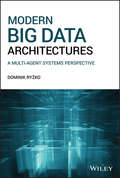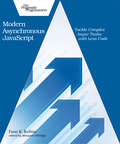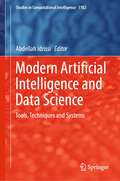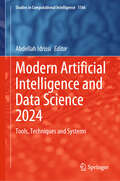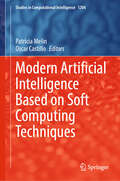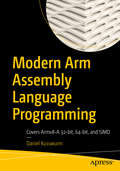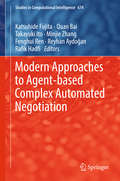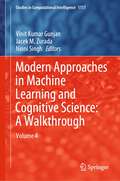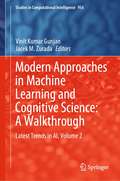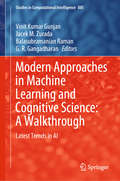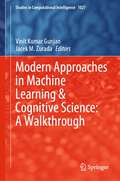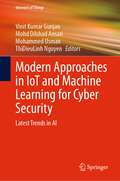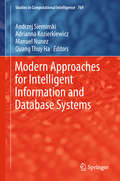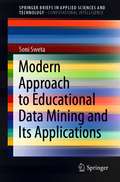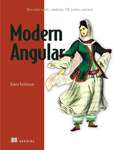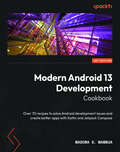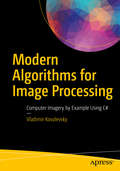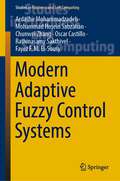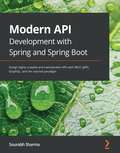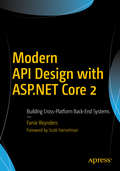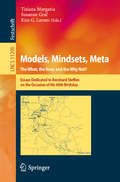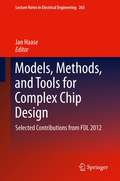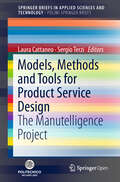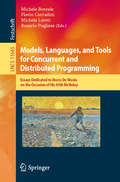- Table View
- List View
Modern Big Data Architectures: A Multi-Agent Systems Perspective
by Dominik RyzkoProvides an up-to-date analysis of big data and multi-agent systems The term Big Data refers to the cases, where data sets are too large or too complex for traditional data-processing software. With the spread of new concepts such as Edge Computing or the Internet of Things, production, processing and consumption of this data becomes more and more distributed. As a result, applications increasingly require multiple agents that can work together. A multi-agent system (MAS) is a self-organized computer system that comprises multiple intelligent agents interacting to solve problems that are beyond the capacities of individual agents. Modern Big Data Architectures examines modern concepts and architecture for Big Data processing and analytics. This unique, up-to-date volume provides joint analysis of big data and multi-agent systems, with emphasis on distributed, intelligent processing of very large data sets. Each chapter contains practical examples and detailed solutions suitable for a wide variety of applications. The author, an internationally-recognized expert in Big Data and distributed Artificial Intelligence, demonstrates how base concepts such as agent, actor, and micro-service have reached a point of convergence—enabling next generation systems to be built by incorporating the best aspects of the field. This book: Illustrates how data sets are produced and how they can be utilized in various areas of industry and science Explains how to apply common computational models and state-of-the-art architectures to process Big Data tasks Discusses current and emerging Big Data applications of Artificial Intelligence Modern Big Data Architectures: A Multi-Agent Systems Perspective is a timely and important resource for data science professionals and students involved in Big Data analytics, and machine and artificial learning.
Modern Asynchronous JavaScript
by Faraz K. KelhiniJavaScript today must interact with data-intensive APIs and networks. The solution is a program that can work asynchronously instead of finishing tasks in order. In modern JavaScript, instead of callbacks you'll use promises to improve your application's performance and responsiveness. JavaScript features introduced in ES2020, ES2021, and ESNext like Promise.allSettled(), Promise.any(), and top-level await help you develop small, fast, low-profile applications. With the AbortController API, cancel a pending async request before it has completed. Modern Asynchronous JavaScript gives you an arsenal of tools to build programs that always respond to user requests, recover quickly from difficult conditions, and deliver maximum performance. Applications today must work with information on remote servers, and users expect a quick response to complex interactions at all times, whether on a high-speed 5G cellular network or slow public WiFi. JavaScript provides developers with advanced tools to coordinate the asynchronous parts of their code efficiently and deliver responsive programs. Faster applications equal happier users, which is the promise of asynchronous JavaScript. With Modern Asynchronous JavaScript you'll learn techniques for managing your async code. Features like ES2021 Promise.any() allow you to safeguard your async code from external issues that are out of your control like server downtime. You'll discover secret weapons like top-level await to initialize resources, define dependency paths dynamically, and load dependencies with a fallback implementation. You'll even learn to how to set a time limit for async requests and react if they take too long to complete. Fast, reliable applications are a must in today's world, where users demand increasingly greater amounts of data on mobile devices. Asynchronous programming may require more cautious planning than synchronous programming but the outcome is rewarding. Asynchronous JavaScript allows you to write code that is nimble but reliable, leading to programs that load faster, respond quicker, and most importantly that you can trust to function properly. What You Need: You'll need an intermediate level of JavaScript programming skills and a browser that supports features from ES2020, ES2021, and ESNext.
Modern Artificial Intelligence and Data Science: Tools, Techniques and Systems (Studies in Computational Intelligence #1102)
by Abdellah IdrissiThis Book, through its various chapters presenting the Recent Advances in Modern Artificial Intelligence and Data Science as well as their Applications, aims to set up lasting and real applications necessary for both academics and professionals. Readers find here the fruit of many research ideas covering a wide range of application areas that can be explored for the advancement of their research or the development of their business. These ideas present new techniques and trends projected in various areas of daily life. Through its proposals of new ideas, this Book serves as a real guide both for experienced readers and for beginners in these specialized fields. It also covers several applications that explain how they can support some societal challenges such as education, health, agriculture, clean energy, business, environment, security and many more. This Book is therefore intended for Designers, Developers, Decision-Makers, Consultants, Engineers, and of course Master's/Doctoral Students, Researchers and Academics.
Modern Artificial Intelligence and Data Science 2024: Tools, Techniques and Systems (Studies in Computational Intelligence #1166)
by Abdellah IdrissiThis book, through its various chapters presenting recent advances in Modern Artificial Intelligence and Data Science as well as their applications, aims to set up lasting and real applications necessary for both academics and professionals. By its proposals of new ideas, it serves as a real guide both to informed readers and to beginners in these specialized fields. It also covers applications that discuss how they can support societal challenges such as education, health, agriculture, clean energy, business, environment, and security. Readers will find here the fruit of many research ideas covering a wide range of application areas that can be explored for the advancement of their research or the development of their business. These ideas present new techniques and trends projected in various areas of daily life. This book is therefore intended for Designers, Developers, Decision-Makers, Consultants, Engineers, and of course Master's/Doctorate Students, Researchers, and Universities.
Modern Artificial Intelligence Based on Soft Computing Techniques (Studies in Computational Intelligence #1204)
by Oscar Castillo Patricia MelinThis book describes what we can call modern artificial intelligence that includes the theoretical developments and applications of soft computing techniques. Soft computing includes fuzzy logic, neural networks and meta-heuristic algorithms, as well as their hybrid combinations. There are papers with the main topics from type-1 to type-3 fuzzy logic, which basically consists of a group of papers that propose new concepts and algorithms based on type-1, type-2 and type-3 fuzzy logic and their applications. There are also papers that present theory and practice of meta-heuristics in diverse application areas. There are interesting papers on different applications of fuzzy logic, neural networks and hybrid intelligent systems in medical problems. In addition, we can find papers describing applications of fuzzy logic, neural networks and meta-heuristics in robotics problems.
Modern Art in Cold War Beirut: Drawing Alliances (Routledge Research in Art History)
by Sarah RogersModern Art in Cold War Beirut: Drawing Alliances examines the entangled histories of modern art and international politics during the decades of the 1950s and 1960s. Positing the Cold War as a globalized conflict, fraught with different political ideologies and intercultural exchanges, this study asks how these historical circumstances shaped local debates in Beirut over artistic pedagogy, the social role of the artist, the aesthetics of form, and, ultimately, the development of a national art. Drawing on a range of archival material and taking an interdisciplinary approach, Sarah Rogers argues that the genealogies of modern art can never be understood as isolated, national histories, but rather that they participate in an ever contingent global modernism. This book will be of particular interest to scholars in art history, Cold War studies, and Middle East studies.
Modern Arm Assembly Language Programming: Covers Armv8-A 32-bit, 64-bit, and SIMD
by Daniel KusswurmGain the fundamentals of Armv8-A 32-bit and 64-bit assembly language programming. This book emphasizes Armv8-A assembly language topics that are relevant to modern software development. It is designed to help you quickly understand Armv8-A assembly language programming and the computational resources of Arm’s SIMD platform. It also contains an abundance of source code that is structured to accelerate learning and comprehension of essential Armv8-A assembly language constructs and SIMD programming concepts. After reading this book, you will be able to code performance-optimized functions and algorithms using Armv8- A 32-bit and 64-bit assembly language. Modern Arm Assembly Language Programming accentuates the coding of Armv8-A 32-bit and 64-bit assembly language functions that are callable from C++. Multiple chapters are also devoted to Armv8-A SIMD assembly language programming. These chapters discuss how to code functions that are used in computationally intense applications such as machine learning, image processing, audio and video encoding, and computer graphics. The source code examples were developed using the GNU toolchain (g++, gas, and make) and tested on a Raspberry Pi 4 Model B running Raspbian (32-bit) and Ubuntu Server (64-bit). It is important to note that this is a book about Armv8-A assembly language programming and not the Raspberry Pi. What You Will Learn See essential details about the Armv8-A 32-bit and 64-bit architectures including data types, general purpose registers, floating-point and SIMD registers, and addressing modes Use the Armv8-A 32-bit and 64-bit instruction sets to create performance-enhancing functions that are callable from C++ Employ Armv8-A assembly language to efficiently manipulate common data types and programming constructs including integers, arrays, matrices, and user-defined structures Create assembly language functions that perform scalar floating-point arithmetic using the Armv8-A 32-bit and 64-bit instruction sets Harness the Armv8-A SIMD instruction sets to significantly accelerate the performance of computationally intense algorithms in applications such as machine learning, image processing, computer graphics, mathematics, and statistics. Apply leading-edge coding strategies and techniques to optimally exploit the Armv8-A 32-bit and 64-bit instruction sets for maximum possible performance Who This Book Is For Software developers who are creating programs for Armv8-A platforms and want to learn how to code performance-enhancing algorithms and functions using the Armv8-A 32-bit and 64-bit instruction sets. Readers should have previous high-level language programming experience and a basic understanding of C++.
Modern Approaches to Agent-based Complex Automated Negotiation
by Quan Bai Fenghui Ren Minjie Zhang Takayuki Ito Katsuhide Fujita Reyhan Aydoğan Rafik HadfiThis book addresses several important aspects of complex automated negotiations and introduces a number of modern approaches for facilitating agents to conduct complex negotiations. It demonstrates that autonomous negotiation is one of the most important areas in the field of autonomous agents and multi-agent systems. Further, it presents complex automated negotiation scenarios that involve negotiation encounters that may have, for instance, a large number of agents, a large number of issues with strong interdependencies and/or real-time constraints.
Modern Approaches in Machine Learning and Cognitive Science: Volume 4 (Studies in Computational Intelligence #1117)
by Vinit Kumar Gunjan Jacek M. Zurada Ninni SinghThis book provides a systematic and comprehensive overview of cognitive intelligence and AI-enabled IoT ecosystem and machine learning, capable of recognizing the object pattern in complex and large data sets. A remarkable success has been experienced in the last decade by emulating the brain–computer interface. It presents the applied cognitive science methods and AI-enabled technologies that have played a vital role at the core of practical solutions for a wide scope of tasks between handheld apps and industrial process control, autonomous vehicles, IoT, intelligent learning environment, game theory, human computer interaction, environmental policies, life sciences, playing computer games, computational theory, and engineering development.The book contains contents highlighting artificial neural networks that are analogous to the networks of neurons that comprise the brain and have given computers the ability to distinguish an image of a cat from one of a coconut, to spot pedestrians with enough accuracy to direct a self-driving car, and to recognize and respond to the spoken word. The chapters in this book focus on audiences interested in artificial intelligence, machine learning, fuzzy, cognitive and neurofuzzy-inspired computational systems, their theories, mechanisms, and architecture, which underline human and animal behavior, and their application to conscious and intelligent systems. In the current version, it focuses on the successful implementation and step-by-step execution and explanation of practical applications of the domain. It also offers a wide range of inspiring and interesting cutting-edge contributions on applications of machine learning, artificial intelligence, and cognitive science such as healthcare products, AI-enabled IoT, gaming, medical, and engineering.Overall, this book provides valuable information on effective, cutting-edge techniques, and approaches for students, researchers, practitioners, and academics in the field of machine learning and cognitive science. Furthermore, the purpose of this book is to address the interests of a broad spectrum of practitioners, students, and researchers, who are interested in applying machine learning and cognitive science methods in their respective domains.
Modern Approaches in Machine Learning and Cognitive Science: Latest Trends in AI, Volume 2 (Studies in Computational Intelligence #956)
by Vinit Kumar Gunjan Jacek M. ZuradaThis book provides a systematic and comprehensive overview of machine learning with cognitive science methods and technologies which have played an important role at the core of practical solutions for a wide scope of tasks between handheld apps, industrial process control, autonomous vehicles, environmental policies, life sciences, playing computer games, computational theory, and engineering development. The chapters in this book focus on readers interested in machine learning, cognitive and neuro-inspired computational systems – theories, mechanisms, and architecture, which underline human and animal behaviour, and their application to conscious and intelligent systems. In the current version, it focuses on the successful implementation and step-by-step explanation of practical applications of the domain. It also offers a wide range of inspiring and interesting cutting-edge contributions to applications of machine learning and cognitive science such as healthcare products, medical electronics, and gaming. Overall, this book provides valuable information on effective, cutting-edge techniques and approaches for students, researchers, practitioners, and academicians working in the field of AI, neural network, machine learning, and cognitive science. Furthermore, the purpose of this book is to address the interests of a broad spectrum of practitioners, students, and researchers, who are interested in applying machine learning and cognitive science methods in their respective domains.
Modern Approaches in Machine Learning and Cognitive Science: Latest Trends in AI (Studies in Computational Intelligence #885)
by G. R. Gangadharan Vinit Kumar Gunjan Jacek M. Zurada Balasubramanian RamanThis book discusses various machine learning & cognitive science approaches, presenting high-throughput research by experts in this area. Bringing together machine learning, cognitive science and other aspects of artificial intelligence to help provide a roadmap for future research on intelligent systems, the book is a valuable reference resource for students, researchers and industry practitioners wanting to keep abreast of recent developments in this dynamic, exciting and profitable research field. It is intended for postgraduate students, researchers, scholars and developers who are interested in machine learning and cognitive research, and is also suitable for senior undergraduate courses in related topics. Further, it is useful for practitioners dealing with advanced data processing, applied mathematicians, developers of software for agent-oriented systems and developers of embedded and real-time systems.
Modern Approaches in Machine Learning & Cognitive Science: A Walkthrough (Studies in Computational Intelligence #1027)
by Vinit Kumar Gunjan Jacek M. ZuradaThis book provides a systematic and comprehensive overview of AI and machine learning which have got the ability to identify patterns in large and complex data sets. A remarkable success has been experienced in the last decade by emulating the brain computer interface. It presents the cognitive science methods and technologies that have played an important role at the core of practical solutions for a wide scope of tasks between handheld apps, industrial process control, autonomous vehicles, environmental policies, life sciences, playing computer games, computational theory, and engineering development. The chapters in this book focuses on audiences interested in machine learning, cognitive and neuro-inspired computational systems, their theories, mechanisms, and architecture, which underline human and animal behaviour, and their application to conscious and intelligent systems. In the current version, it focuses on the successful implementation and step-by-step explanation of practical applications of the domain. It also offers a wide range of inspiring and interesting cutting-edge contributions on applications of machine learning and cognitive science such as healthcare products, medical electronics, and gaming.
Modern Approaches in IoT and Machine Learning for Cyber Security: Latest Trends in AI (Internet of Things)
by Vinit Kumar Gunjan Mohammed Usman Mohd Dilshad Ansari ThiDieuLinh NguyenThis book examines the cyber risks associated with Internet of Things (IoT) and highlights the cyber security capabilities that IoT platforms must have in order to address those cyber risks effectively. The chapters fuse together deep cyber security expertise with artificial intelligence (AI), machine learning, and advanced analytics tools, which allows readers to evaluate, emulate, outpace, and eliminate threats in real time. The book’s chapters are written by experts of IoT and machine learning to help examine the computer-based crimes of the next decade. They highlight on automated processes for analyzing cyber frauds in the current systems and predict what is on the horizon. This book is applicable for researchers and professionals in cyber security, AI, and IoT.
Modern Approaches for Intelligent Information and Database Systems (Studies In Computational Intelligence #769)
by Andrzej Sieminski Adrianna Kozierkiewicz Manuel Nunez Quang Thuy HaThis book offers a unique blend of reports on both theoretical models and their applications in the area of Intelligent Information and Database Systems. The reports cover a broad range of research topics, including advanced learning techniques, knowledge engineering, Natural Language Processing (NLP), decision support systems, Internet of things (IoT), computer vision, and tools and techniques for Intelligent Information Systems. They are extended versions of papers presented at the ACIIDS 2018 conference (10th Asian Conference on Intelligent Information and Database Systems), which was held in Dong Hoi City, Vietnam on 19–21 March 2018. What all researchers and students of computer science need is a state-of-the-art report on the latest trends in their respective areas of interest. Over the years, researchers have proposed increasingly complex theoretical models, which provide the theoretical basis for numerous applications. The applications, in turn, have a profound influence on virtually every aspect of human activities, while also allowing us to validate the underlying theoretical concepts.
Modern Approach to Educational Data Mining and Its Applications (SpringerBriefs in Applied Sciences and Technology)
by Soni SwetaThis book emphasizes that learning efficiency of the learners can be increased by providing personalized course materials and guiding them to attune with suitable learning paths based on their characteristics such as learning style, knowledge level, emotion, motivation, self-efficacy and many more learning ability factors in e-learning system. Learning is a continuous process since human evolution. In fact, it is related to life and innovations. The basic objective of learning to grow, aspire and develop ease of life remains the same despite changes in the learning methodologies. Introduction of computers empowered us to attain new zenith in knowledge domain, developed pragmatic approach to solve life’s problem and helped us to decipher different hidden patterns of data to get new ideas. Of late, computers are predominantly used in education. Its process has been changed from offline to online in view of enhancing the ease of learning. With the advent of information technology, e-learning has taken centre stage in educational domain. In e-learning context, developing adaptive e-learning system is buzzword among contemporary research scholars in the area of Educational Data Mining (EDM). Enabling personalized systems is meant for improvement in learning experience for learners as per their choices made or auto-detected needs. It helps in enhancing their performance in terms of knowledge, skills, aptitudes and preferences. It also enables speeding up the learning process qualitatively and quantitatively. These objectives are met only by the Personalized Adaptive E-learning Systems in this regard. Many noble frameworks were conceptualized, designed and developed to infer learning style preferences, and accordingly, learning materials were delivered adaptively to the learners. Designing frameworks help to measure learners’ preferences minutely and provide adaptive learning materials to them in a way most appropriately.
Modern Angular: Also covers signals, standalone, SSR, zoneless, and more
by Armen VardanyanDiscover the new features and techniques of the most modern versions of Angular.The powerful Angular framework is ever-evolving, with each new iteration bringing amazing new modern features. Modern Angular gets you rapidly up to speed with Angular&’s latest innovations. Inside Modern Angular you&’ll learn how to: • Create modern Angular apps with the newest framework capabilities • Setting up and structuring your Angular projects • Implement advanced testing strategies for Angular • Benefit from new improvements in debugging, image loading, and component inputs • Apply state management with reactive programming • Explore signals and server-side rendering • Migrate legacy Angular projects to modern practices • Refactor old Angular patterns using new techniques • Use modern performance optimization approaches to improve User Experience Discover new ways of working with components, dependency injection, RxJS, Signals, and more—all through building a complete enterprise-grade HR management system! You&’ll soon be improving your daily development with Angular&’s quality-of-life features, upgrading your app&’s performance with server-side rendering, and getting ready for what&’s coming Angular&’s future. Plus, detailed migration guides demonstrate ways to update existing apps to modern patterns, and make it easy to modernize your legacy code. Purchase of the print book includes a free eBook in PDF and ePub formats from Manning Publications. About the technology Modern web applications have to handle serious challenges, such as complex state management, reactive programming, and SEO. With a host of new features, ecosystem tools, and programming practices, the Angular web framework tackles modern web development head on. If you haven&’t tried modern Angular, you&’re in for a treat! About the book Modern Angular updates your web development skills to take advantage of new Angular features like signals, server-side rendering, and zoneless change detection. Each chapter explores an exciting capability by adding it hands-on to a full-featured app for managing HR systems. Along the way, you&’ll explore dependency injection, RxJS, and standalone components, and pick up techniques for upgrading legacy apps. What's inside • Advanced testing strategies • RxJS and custom operators • Performance and search engine optimization • Migrate legacy Angular projects About the reader For experienced Angular developers. Covers Angular versions 12 and later. About the author Armen Vardanyan is a developer, educator, and Google Developer Expert for Angular. He writes articles about Angular, TypeScript, NgRx, and is a panelist for the popular Adventures in Angular podcast. Table of Contents 1 Welcome to modern Angular 2 A standalone future 3 Revitalized dependency injection 4 New capabilities of Angular building blocks 5 RxJS in modern Angular 6 Signals: A new approach to reactive programming 7 Signals: A deep dive 8 Unit testing in modern Angular 9 Modern Angular everywhere 10 What&’s next in modern Angular?
Modern Android 13 Development Cookbook: Over 70 recipes to solve Android development issues and create better apps with Kotlin and Jetpack Compose
by Madona S. WambuaSave months of trial and error with concise guided recipes in this part-color guide and build exceptional Android applications and wearables and support the new foldable technology by using the latest Jetpack libraries Key FeaturesLeverage the power of the latest Jetpack libraries in your day-to-day Android development tasksExplore Wear OS and build large screens to support the foldable world using the declarative approachWrite tests and debug your code as you discover the most useful tips, tricks, and best practicesPurchase of the print or Kindle book includes a free PDF eBookBook DescriptionAndroid is a powerful operating system widely used in various devices, phones, TVs, wearables, automobiles, and more. This Android cookbook will teach you how to leverage the latest Android development technologies for creating incredible applications while making effective use of popular Jetpack libraries. You’ll also learn which critical principles to consider when developing Android apps. The book begins with recipes to get you started with the declarative UI framework, Jetpack Compose, and help you with handling UI states, Navigation, Hilt, Room, Wear OS, and more as you learn what's new in modern Android development. Subsequent chapters will focus on developing apps for large screens, leveraging Jetpack’s WorkManager, managing graphic user interface alerts, and tips and tricks within Android studio. Throughout the book, you'll also see testing being implemented for enhancing Android development, and gain insights into harnessing the integrated development environment of Android studio. Finally, you’ll discover best practices for robust modern app development. By the end of this book, you’ll be able to build an Android application using the Kotlin programming language and the newest modern Android development technologies, resulting in highly efficient applications.What you will learnUse Kotlin programming to build your Android applicationsLeverage modern Android development (MAD) libraries to create exceptional appsExplore modern app architecture concepts such as model-view-viewmodel (MVVM)Utilize dependency injection, clean architecture, and module organizationDiscover how to write UI and unit tests for your applicationsGet to grips with paging, data binding, and datastoreBuild large screens to support the new foldable worldExplore principles of Wear OS in modern Android developmentWho this book is forThis book is for active junior-to-mid-level Android developers with one to two years of professional experience in developing Android applications who are interested in advancing their knowledge of Android development. The recipes in this book use Kotlin and not Java.
Modern Algorithms for Image Processing: Computer Imagery by Example Using C#
by Vladimir Kovalevsky<p>Utilize modern methods for digital image processing and take advantage of the many time-saving templates provided for all of the projects in this book. <p>Modern Algorithms for Image Processing approaches the topic of image processing through teaching by example. Throughout the book, you will create projects that resolve typical problems that you might encounter in the world of digital image processing. Some projects teach you methods for addressing the quality of images, such as reducing random errors or noise and suppressing pulse noise (salt and pepper), a method valuable for improving the quality of historical images. Other methods detail how to correct inhomogeneous illumination, not by means of subtracting the mean illumination, but through division, a far more efficient method. Additional projects cover contrasting, and a process for edge detection, more efficient than Canny's, for detecting edges in color images directly, without converting them into black and white images. <p>What You'll Learn: <p> <li>Apply innovative methods for suppressing pulse noise, enhancing contrast, and edge detection <li>Know the pros and cons of enlisting a particular method <li>Use new approaches for image compression and recognizing circles in photos <li>Utilize a valuable method for straightening photos of paintings taken at an oblique angle, a critical concept to understand when using flash at a right angle <li>Understand the problem statement of polygonal approximation of boundaries or edges and its solution <li>Use a new method for detecting bicycles in traffic <li>Access complete source code examples in C# for all of the projects</li> <p> <p>Who This Book Is For: <p>C# developers who work with digital image processing or are interested in informatics. The reader should have programming experience and access to an integrated development environment (IDE), ideally .NET. <p>This book does not prove or disprove theorems, but suggests methods for learning valuable concepts that will enable you to customize your own image processing projects.</p>
Modern Adaptive Fuzzy Control Systems (Studies in Fuzziness and Soft Computing #421)
by Oscar Castillo Chunwei Zhang Rathinasamy Sakthivel Ardashir Mohammadzadeh Mohammad Hosein Sabzalian Fayez F. El-SousyThis book explains the basic concepts, theory and applications of fuzzy systems in control in a simple unified approach with clear ex-amples and simulations in the MATLAB programming language. Fuzzy systems, especially, type-2 neuro-fuzzy systems, are now used extensively in various engineering fields for different purposes. In plain language, this book aims to practically explain fuzzy sys-tems and different methods of training and optimizing these systems. For this purpose, type-2 neuro-fuzzy systems are first analyzed along with various methods of training and optimizing these systems through implementation in MATLAB. These systems are then em-ployed to design adaptive fuzzy controllers. The authors aim at pre-senting all the well-known optimization methods clearly and code them in the MATLAB language.
Modern API Development with Spring and Spring Boot: Design highly scalable and maintainable APIs with REST, gRPC, GraphQL, and the reactive paradigm
by Sourabh SharmaA developer's guide to designing, testing, and securing production-ready modern APIs with the help of practical ideas to improve your application's functionalityKey FeaturesBuild resilient software for your enterprises and customers by understanding the complete API development life cycleOvercome the challenges of traditional API design by adapting to a new and evolving culture of modern API developmentUse Spring and Spring Boot to develop future-proof scalable APIsBook DescriptionThe philosophy of API development has evolved over the years to serve the modern needs of enterprise architecture, and developers need to know how to adapt to these modern API design principles. Apps are now developed with APIs that enable ease of integration for the cloud environment and distributed systems. With this Spring book, you'll discover various kinds of production-ready API implementation using REST APIs and explore async using the reactive paradigm, gRPC, and GraphQL. You'll learn how to design evolving REST-based APIs supported by HATEOAS and ETAGs and develop reactive, async, non-blocking APIs. After that, you'll see how to secure REST APIs using Spring Security and find out how the APIs that you develop are consumed by the app's UI. The book then takes you through the process of testing, deploying, logging, and monitoring your APIs. You'll also explore API development using gRPC and GraphQL and design modern scalable architecture with microservices. The book helps you gain practical knowledge of modern API implementation using a sample e-commerce app. By the end of this Spring book, you'll be able to develop, test, and deploy highly scalable, maintainable, and developer-friendly APIs to help your customers to transform their business.What you will learnUnderstand RESTful API development, its design paradigm, and its best practicesBecome well versed in Spring's core components for implementing RESTful web servicesImplement reactive APIs and explore async API developmentApply Spring Security for authentication using JWT and authorization of requestsDevelop a React-based UI to consume APIsImplement gRPC inter-service communicationDesign GraphQL-based APIs by understanding workflows and toolingGain insights into how you can secure, test, monitor, and deploy your APIsWho this book is forThis book is for inexperienced Java programmers, comp science, or coding boot camp graduates who have knowledge of basic programming constructs, data structures, and algorithms in Java but lack the practical web development skills necessary to start working as a developer. Professionals who've recently joined a startup or a company and are tasked with creating real-world web APIs and services will also find this book helpful. This book is also a good resource for Java developers who are looking for a career move into web development to get started with the basics of web service development.
Modern API Design with ASP.NET Core 2: Building Cross-platform Back-end Systems
by Fanie ReyndersUse ASP.NET Core 2 to create durable and cross-platform web APIs through a series of applied, practical scenarios. Examples in this book help you build APIs that are fast and scalable. You’ll progress from the basics of the framework through to solving the complex problems encountered in implementing secure RESTful services. The book is packed full of examples showing how Microsoft’s ground-up rewrite of ASP.NET Core 2 enables native cross-platform applications that are fast and modular, allowing your cloud-ready server applications to scale as your business grows. Major topics covered in the book include the fundamentals and core concepts of ASP.NET Core 2. You'll learn about building RESTful APIs with the MVC pattern using proven best practices and following the six principles of REST. Examples in the book help in learning to develop world-class web APIs and applications that can run on any platform, including Windows, Linux, and MacOS. You can even deploy to Microsoft Azure and automate your delivery by implementing Continuous Integration and Continuous Deployment pipelines.What You Will LearnIncorporate automated API tooling such as Swagger from the OpenAPI specificationStandardize query and response formats using Facebook’s GraphQL query languageImplement security by applying authentication and authorization using ASP.NET IdentityEnsure the safe storage of sensitive data using the data protection stackCreate unit and integration tests to guarantee code qualityWho This Book Is ForDevelopers who build server applications such as web sites and web APIs that need to run fast and cross platform; programmers who want to implement practical solutions for real-world problems; those who want in-depth knowledge of the latest bits of ASP.NET Core 2.0
Models, Mindsets, Meta: Essays Dedicated to Bernhard Steffen on the Occasion of His 60th Birthday (Lecture Notes in Computer Science #11200)
by Tiziana Margaria Susanne Graf Kim G. LarsenThis Festschrift volume is published in honor of Bernhard Steffen, Professor at the Technical University of Dortmund, on the occasion of his 60th birthday. His vision as well as his theoretical and practical work span the development and implementation of novel, specific algorithms, and the establishment of cross-community relationships with the effect to obtain simpler, yet more powerful solutions. He initiated many new lines of research through seminal papers that pioneered various fields, starting with the Concurrency Workbench, a model checking toolbox that significantly influenced the research and development of mode based high assurance systems worldwide. The contributions in this volume reflect the breadth and impact of his work. The introductory paper by the volume editors, the 23 full papers and two personal statements relate to Bernhard’s research and life. This volume, the talks and the entire B-Day at ISoLA 2018 are a tribute to the first 30 years of Bernhard’s passion, impact and vision for many facets of computer science in general and for formal methods in particular. Impact and vision include the many roles that formal methods-supported software development should play in education, in industry and in society.
Models, Methods, and Tools for Complex Chip Design
by Jan HaaseThis book brings together a selection of the best papers from the fifteenth edition of the Forum on specification and Design Languages Conference (FDL), which was held in September 2012 at Vienna University of Technology, Vienna, Austria. FDL is a well-established international forum devoted to dissemination of research results, practical experiences and new ideas in the application of specification, design and verification languages to the design, modeling and verification of integrated circuits, complex hardware/software embedded systems, and mixed-technology systems.
Models, Methods and Tools for Product Service Design: The Manutelligence Project (SpringerBriefs in Applied Sciences and Technology)
by Laura Cattaneo Sergio TerziThis open access book summarizes research being pursued within the Manutelligence project, the goal of which is to help enterprises develop smart, social and flexible products with high value added services. Manutelligence has improved Product and Service Design by developing suitable models and methods, and connecting them through a modular, collaborative and secure ICT Platform. The use of real data collected in real time by Internet of Things (IoT) technologies underpins the design of product-service systems and makes it possible to monitor them throughout their life cycle. Available data allows costs and sustainability issues to be more accurately measured and simulated in the form of Life Cycle Cost (LCC) and Life Cycle Assessment (LCA). Analysing data from IoT systems and sharing LCC and LCA information via the ICT Platform can help to accelerate the design of product-service systems, reduce costs and better understand customer needs. Industrial partners involved in Manutelligence provide a clear overview of the project’s outcomes, and demonstrate how its technological solutions can be used to improve the design of product-service systems and the management of product-service life cycles.
Models, Languages, and Tools for Concurrent and Distributed Programming: Essays Dedicated to Rocco De Nicola on the Occasion of His 65th Birthday (Lecture Notes in Computer Science #11665)
by Flavio Corradini Michele Loreti Michele Boreale Rosario PuglieseThis volume was published in honor of Rocco De Nicola’s 65th birthday. The Festschrift volume contains 27 papers written by close collaborators and friends of Rocco De Nicola and was presented to Rocco on the 1st of July 2019 during a two-day symposium held in Lucca, Italy. The papers present many research ideas that have been influenced by Rocco's work. They testify his intellectual curiosity, versatility and tireless research activity, and provide an overview of further developments to come. The volume consists of six sections. The first one contains a laudation illustrating the distinguished career and the main scientific contributions by Rocco and a witness of working experiences with Rocco. The remaining five sections comprise scientific papers related to specific research interests of Rocco and are ordered according to his scientific evolution: Observational Semantics; Logics and Types; Coordination Models and Languages; Distributed Systems Modelling; Security.
